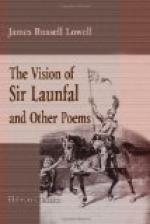Lowell’s rich and varied personality presents a type of cultured manhood that is the finest product of American democracy. The largeness of his interests and the versatility of his intellectual powers give him a unique eminence among American authors. His genius was undoubtedly embarrassed by the diffusive tendency of his interests. He might have been a greater poet had he been less the reformer and statesman, and his creative impulses were often absorbed in the mere enjoyment of exercising his critical faculty. Although he achieved only a qualified eminence as poet, or as prose writer, yet because of the breadth and variety of his permanent achievement he must be regarded as our greatest man of letters. His sympathetic interest, always outflowing toward concrete humanity, was a quality—
“With such large range
as from the ale-house bench
Can reach the stars and be
with both at home.”
With marvelous versatility and equal ease he could talk with the down-east farmer and salty seamen and exchange elegant compliments with old world royalty. In The Cathedral he says significantly:
“I thank benignant nature
most for this,—
A force of sympathy, or call
it lack
Of character firm-planted,
loosing me
From the pent chamber of habitual
self
To dwell enlarged in alien
modes of thought,
Haply distasteful, wholesomer
for that,
And through imagination to
possess,
As they were mine, the lives
of other men.”
In the delightful little poem, The Nightingale in the Study, we have a fanciful expression of the conflict between Lowell’s love of books and love of nature. His friend the catbird calls him “out beneath the unmastered sky,” where the buttercups “brim with wine beyond all Lesbian juice.” But there are ampler skies, he answers, “in Fancy’s land,” and the singers though dead so long—
“Give its best sweetness
to all song.
To nature’s self her
better glory.”
His love of reading is manifest in all his work, giving to his style a bookishness that is sometimes excessive and often troublesome. His expression, though generally direct and clear, and happily colored by personal frankness, is often burdened with learning. To be able to read his essays with full appreciation is in itself evidence of a liberal education. His scholarship was broad and profound, but it was not scholarship in the German sense, exhaustive and exhausting. He studied for the joy of knowing, never for the purpose of being known, and he cared more to know the spirit and meaning of things than to know their causes and origins. A language he learned for the sake of its literature rather than its philology. As Mr. Brownell observes, he shows little interest in the large movements of the world’s history. He seemed to prefer history as sublimated in the poet’s song. The field of belles-lettres was his native province; its atmosphere was most congenial to his tastes. In book-land it was always June for him—




